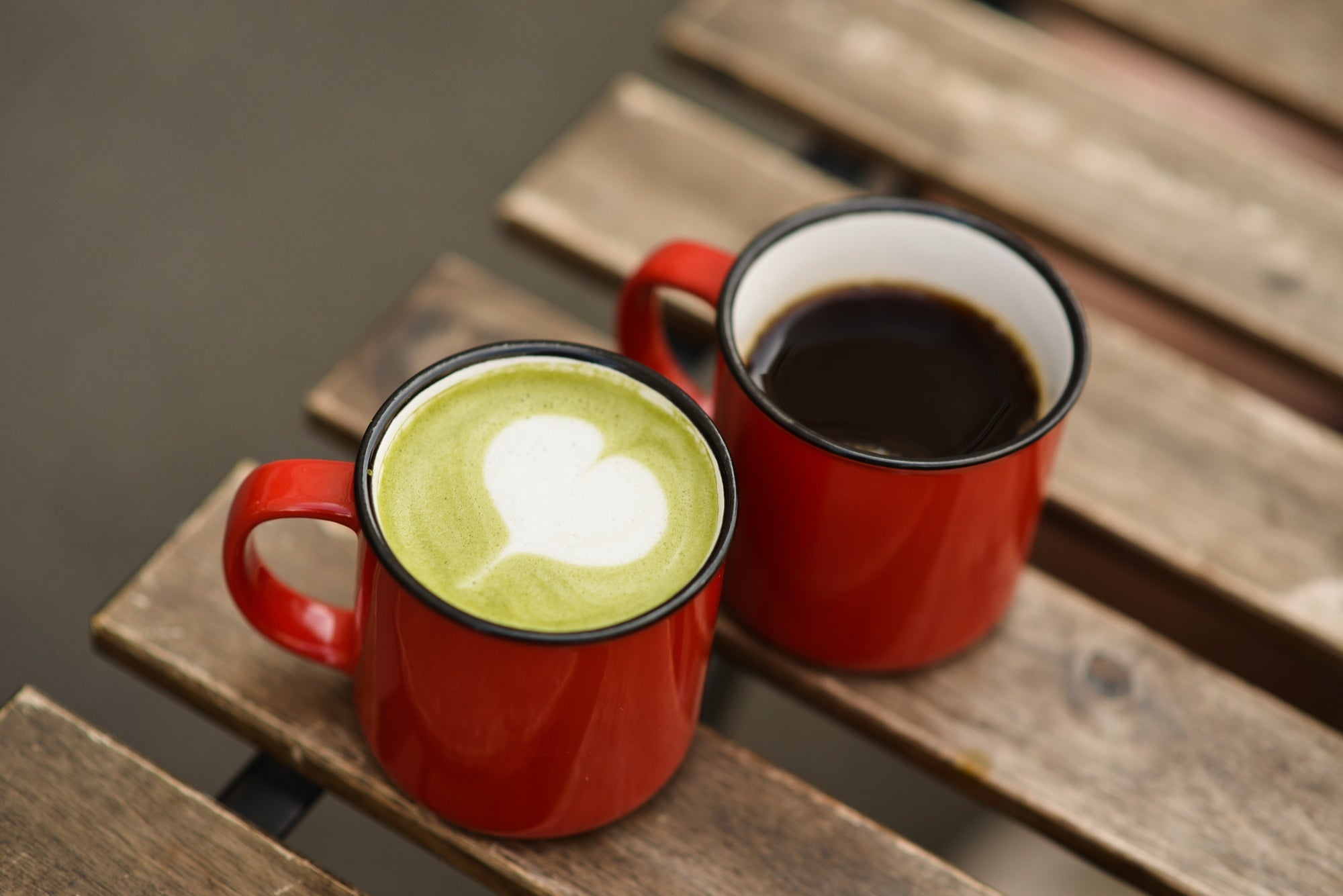
Who could've predicted that our faithful morning pick-me-up, the trusty cup of joe, could ever be nudged off its coffee-stand by the trending underdog, matcha?
Don't get us wrong — coffee will always hold a cherished place in our hearts (and mugs) with its unique bouquet of health benefits. But for those seeking to ditch the caffeine jitters and mid-day crashes, matcha could just be the steady energy sidekick you never knew you craved.
What Is Matcha?
Stepping into the tea scene, we have three common forms: loose leaves, tea bags, and powders. And our star contender, matcha, is a powdered dynamo, crafted from the delicately ground leaves of the tea plant (aka, Camellia sinensis). A native of Japan, matcha has earned legendary status for its myriad health perks.
Matcha has recently pirouetted onto the Western wellness stage, flaunting its credentials as a comforting, warm elixir and a nutrient-packed energizer. Be it savored in its traditional tea guise, as a cool iced latte, or even baked into a scrumptious cake, matcha is steadily stamping its mark across the U.S.
What Are the Health Benefits of Matcha?
This emerald powder is brimming with antioxidant compounds, amino acids, and caffeine, all teaming up to bolster your body in diverse ways.
Here's a sneak peek into matcha's treasure chest of health perks:
Heart's Best Friend: Matcha's star players are catechins, potent antioxidants known to throw a protective shield around your heart.
Brain Power Booster: Matcha earns its stripes as a brain food with its knack for bolstering brain function. The dynamic duo of caffeine and the amino acid L-theanine, both found in matcha, are proven to support cognitive performance and positively impact mood.
Cholesterol & Blood Sugar Checker: Matcha leaves owe their lush green color to chlorophyll, boasting a higher concentration than your everyday green tea leaves. Emerging research links chlorophyll to maintaining healthy cholesterol and blood sugar levels.

Matcha vs. Coffee: What Are the Differences?
Now that you're well on your way to becoming a matcha maestro, let's delve deeper into the face-off. Here's the inside scoop on how matcha and coffee throw their punches.

The Origins of Matcha
Matcha owes its impressive nutritional profile to its specialized cultivation. The time-honored method for nurturing tea bushes to be used for matcha is to shield them from the sun's nutrient-sapping rays with a bamboo cloth. This results in a marked spike in levels of catechins, L-theanine, chlorophyll, and caffeine, compared to your run-of-the-mill green tea leaves.
Taking it one step further, grinding matcha into a super-fine powder ensures that every last nutrient makes it into your cup, compared to the limited nutrient extraction from traditional steeping.
This ingenious technique not only results in bolstered health benefits, but has also become a cultural cornerstone in Japan, transforming the preparation and serving of matcha into a deeply significant art form.

Plant Origins (Origins of Coffee)
For many of us, the morning coffee ritual is a sacred tradition, a beloved jolt of energy that sets the tone for our day.
While matcha hails from the leaves of the tea plant, coffee, in contrast, originates from the seeds of diverse plants belonging to the Coffea genus. It's believed that the first invigorating brew of this caffeine-laden drink was crafted in Ethiopia over a thousand years ago. But the coffee you're familiar with, roasted to perfection, didn't start making the rounds until about 1200 CE.
Type of Energy Support
If you're on the hunt for a novel energy booster to power you through the day, you've hit the jackpot. Both matcha and coffee are rich in caffeine and stand as superb options to kindle your inner spark.
While most teas usually fall short on caffeine compared to brewed coffee, shading matcha green tea plants allows the leaves to retain an impressively high caffeine concentration.
However, these two plants will likely interact differently with your energy levels. Coffee's caffeine is a solo player, ready to infiltrate your adenosine receptors and impede fatigue. It results in an almost immediate sense of energy and focus, but it also sets you up for a potential crash later.
Matcha, on the other hand, delivers a more tranquil alertness, as L-theanine works in harmony with caffeine to moderate its intensity and prevent spikes and crashes.

Caffeine Content
As we've noted, both plants are rich in caffeine, the chemical behind the bitter taste and energizing kick of coffee and matcha.
An eight-ounce serving of coffee packs around 95-180 mg of caffeine, depending on how it's roasted and brewed.
In contrast, a 2 g serving of matcha carries around 38-89 mg of caffeine. It's typically prepared by mixing two grams, or about a teaspoon, of matcha powder with two ounces of hot water.
The caffeine punch in your matcha depends on:
- weather conditions during the tea plant’s life
- growing and harvesting practices
- the specific type of matcha used
How much caffeine is overkill? Research recommends that healthy adults stay within 400 mg of caffeine a day (with pregnant or nursing mothers capping themselves at 300 mg per day).
Types of Antioxidants
You've likely heard that antioxidants are a vital component of a healthy diet. But what exactly is an antioxidant?
In simple terms, antioxidants are compounds that help maintain the health of cells throughout your body. To fully harness the benefits of antioxidants, it's best to consume them straight from the source.
While matcha is teeming with catechins, members of the flavonoid antioxidant group, coffee is abundant in a different type of antioxidant known as melanoidins.

Nutritional Density
Despite their potent antioxidant properties and other healthful attributes, neither coffee nor matcha serve as comprehensive sources of nutrition. It's worth coupling your morning brew with a nourishing breakfast.
Your daily cup of coffee or matcha won't offer much in terms of macronutrients - neither scores high on proteins, carbs, or fats. However, coffee does provide small doses of micronutrients like potassium and calcium, and matcha is a good source of vitamin C.
Preparation
The journey to your perfect brew begins right after the plants are harvested.
Coffee beans undergo a process of roasting and grinding, a transformation that brings out their robust flavors and vivifying effects. In contrast, tea leaves used to make matcha are either pan-fired or steamed, and then dried in order to prevent too much oxidation from occurring, which would turn the leaves brown and change their fresh, vegetal flavor.
Beyond processing, how you prepare your beverage at home is a unique craft, varying dramatically between coffee and matcha. Coffee enthusiasts know there's a multitude of ways to brew their favorite elixir (each coffee aficionado swearing by their method).

Popular brewing techniques include:
- Pour-over
- French press
- Moka pot
- Espresso
- Cold brew

Traditionally, matcha is created by whisking the finely milled powder into hot water, producing a vibrant green frothy concoction with an earthy bitterness.
Other enticing alternatives to experiment with include:
- Iced or hot matcha latte
- Blended into a refreshing smoothie
- Any of these methods using our specially crafted Focus Matcha Superblend
What’s Better: Matcha or Coffee?
Contrasting matcha and coffee can be approached from multiple angles, beginning with flavor profiles. Matcha tends to exude earthy, grassy notes, and can vary from mildly sweet to bitter depending on quality. Similarly, coffee's flavor palette is remarkably diverse. Depending on the roast, you might encounter rich, chocolatey undertones or a surprising splash of berries or citrus.
Financially, matcha will nudge your wallet a bit more, but many argue that it's worth investing a little extra for superior quality matcha or organic coffee.
While coffee dispatches near-instant energy, it can also be the culprit behind unwelcome side effects such as jitteriness. Matcha, conversely, delivers an intriguing blend of relaxation and alertness.

The Bottom Line
The choice between matcha and coffee ultimately hinges on your personal preferences. Both contenders boast a trove of antioxidants and diverse health benefits. Coffee tempts with its bold flavor and swift energy injection. If you're drawn to a distinctive taste, and yearn for sustained energy release, matcha may be your ideal companion.
In the grand scheme of things, it's not so much a battle of superiority but a celebration of diversity. Each brings its unique elements to the table — be it taste, energy, or health benefits.
So whether you're a die-hard coffee aficionado or a matcha devotee, remember that each cup brings its own magic. Perhaps the real beauty lies in exploring both worlds, finding your balance, and relishing the distinct experience each offers. As they say, variety is the spice of life!
